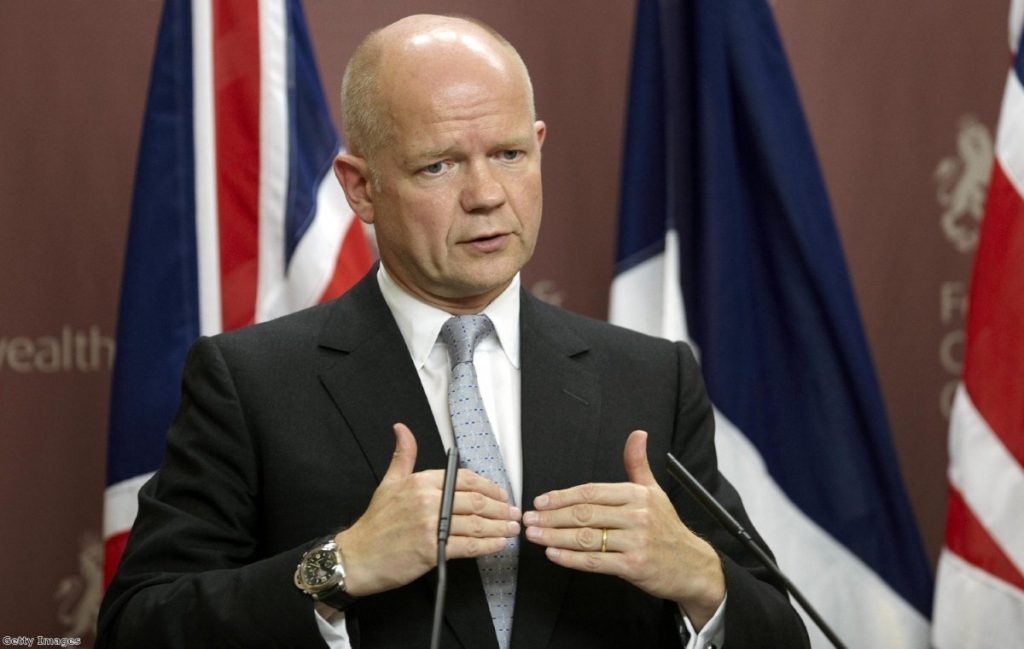Hague and Alexander clash on Syria strategy as G20 looms
Labour and Tory relations over Syria worsened again today, after the parties fell out over how to pursue a political negotiation over the civil war.
Speaking at Foreign Office questions, William Hague dismissed suggestions from Douglas Alexander that Syria talks at this week's G20 summit needed to take place in main discussions, instead of in bilateral meetings.
"Our problem is not being unable to discuss these things. It is being unable to agree how we bring about a transitional government in Syria," Hague replied.
"We have had two and half years of discussion. It is agreement which is elusive."


Alexander said: "It is deeply disappointing that the foreign secretary has apparently accepted that world leaders won’t even get to discuss Syria collectively at the G20 summit in Russia this week.
"The UK must request that the Syrian crisis is top of the agenda, not just discussed on the margins of the meeting."
Critics of the US approach to negotiations called for Iran – a key regional player with a more moderate new leader – to be invited to talks.
Others in the Commons warned Hague about news reports suggesting any US action would attempt to swing momentum in favour of the rebels in addition to deterring future use of chemical weapons.
"I don't believe that to be the intention of the US," Hague said.
"President Barack Obama is very clear any action by the US is to deter future use of chemical weapons and I think we can take him at his word for that."
The debate came as signs emerged that the public's opposition to any military intervention in Syria may be relaxing slightly, with a new poll showing half of British voters believe the Commons should hold a new debate if UN weapon inspectors confirm that chemical weapons were used by president Bashar al-Assad.
The YouGov poll for the Times still found most voters opposed any intervention in Syria, but the flexibility on a second vote suggests the public is more open to argument on the issue that it previously appeared.
The slight shift in public mood corresponds to a wariness about last week's Commons vote in Westminster.
Under questioning from Labour yesterday, defence secretary Phillip Hammond said a second vote could take place if "circumstances change very significantly".
However, Downing Street continues to all-but rule out another vote, not least because a second defeat for David Cameron would raise more questions about his judgement and authority.
But Hague tweeted about the dangers of the conflict.
1 year ago: 230,000 Syrian refugees. Today: 2,000,000. 1/2 children. If we don't end the conflict, think what the figure could be next year
— William Hague (@WilliamJHague) September 3, 2013
UK is 2nd largest bilateral donor to Syrian refugees, helping around 900,000 people, but there is still a huge aid shortfall
— William Hague (@WilliamJHague) September 3, 2013
Voters in France and the US, where parliamentary and Congressional debates are about to take place on military intervention, are also opposed to any strike on Syria.
Two thirds of French people oppose intervention according to a weekend poll. In an interview with French newspaper Le Figaro, Assad proved adept at emphasising French fears over military action.
"Nobody knows what will happen [after such strikes]," he said.
"Everyone will lose control of the situation when the powder keg explodes. Chaos and extremism will spread. The risk of a regional war exists.
"Whoever contributes to financially or militarily to bolstering terrorists is an enemy of the Syrian people. Whoever is against the interests of Syria and its people is an enemy."
He added: "The French people are not our enemy. If the policies of the French state are hostile to the Syrian people, this state will be its enemy. This hostility will end when the French state changes its policies. There will be repercussions – negative, of course – against the interests of France.
"We are fighting terrorists. Eighty to 90 per cent of those we are fighting belong to Al Qaeda. They are not interested in reform or in politics. The only way to deal with them is to annihilate them. Only then will we be able to talk about political measures."
Reports emerging from the US suggest Barack Obama's proposed strike against Syria could be much more substantial than previously anticipated.
That is partly due to facts on the ground, as planners account for the movement of munitions which would have inevitably taken place during the days of debate over intervention in western capitals.
That would prompt strategists to focus more on control and command centres, which cannot be moved.
But the plans may go further than that and aim at shifting the momentum towards rebel forces, possibly even including supplying arms to the opposition.
Meanwhile, Russian president Vladimir Putin is set to be presented with more evidence of Syrian regime culpability in the chemical attacks at the G20 summit in St Petersburg this week.
French intelligence reports say satellite imagery shows the missiles come from regime-controlled areas of Damascus.
It compliments British and US reports which came to the same conclusion.
"Personally I am convinced, not only that a chemical attack has taken place … but I am also convinced that the Syrian regime is responsible," Nato secretary-general Anders Fogh Rasmussen said.
Reports say Assad's forces promptly bombed the areas to prevent further evidence being collected.









